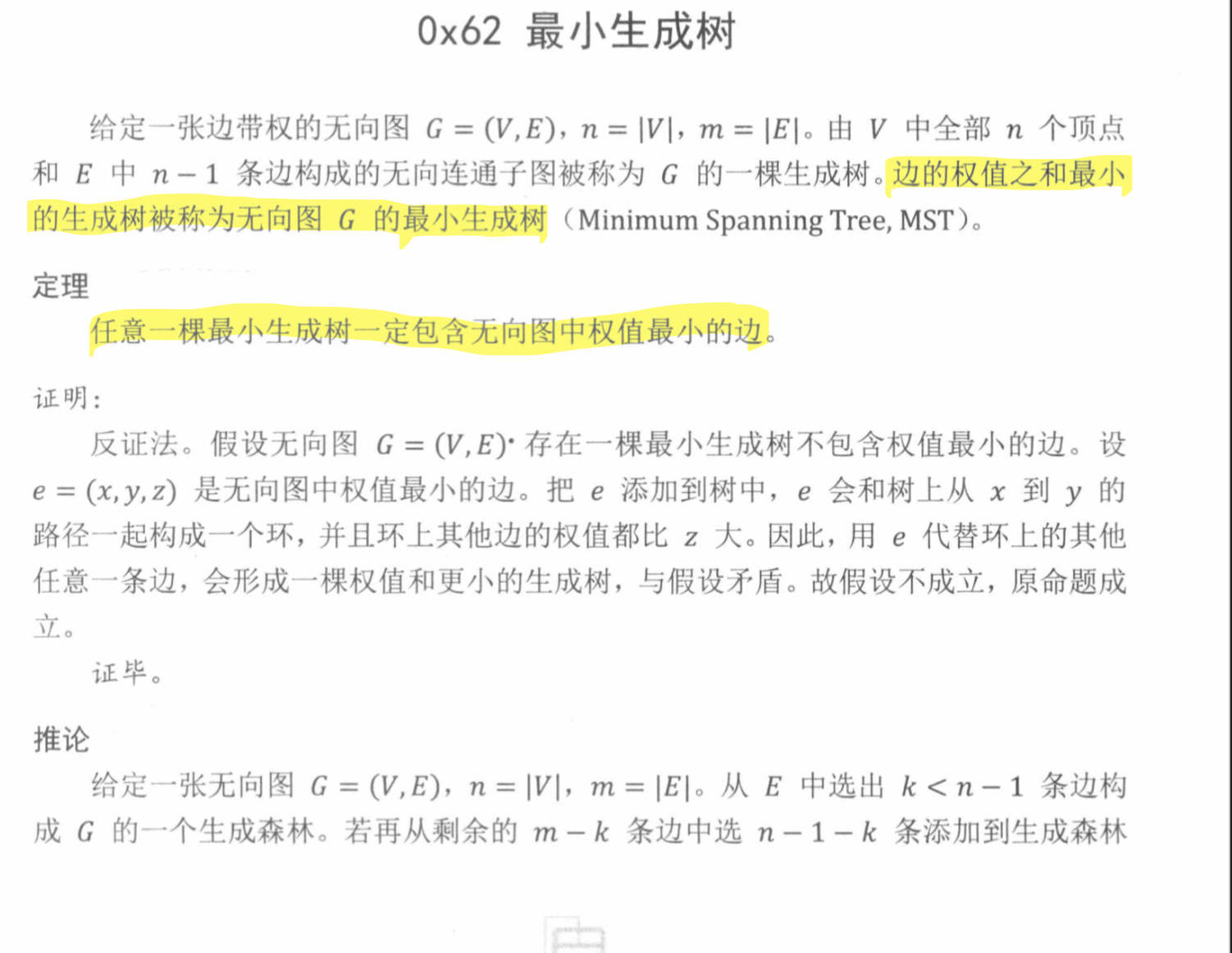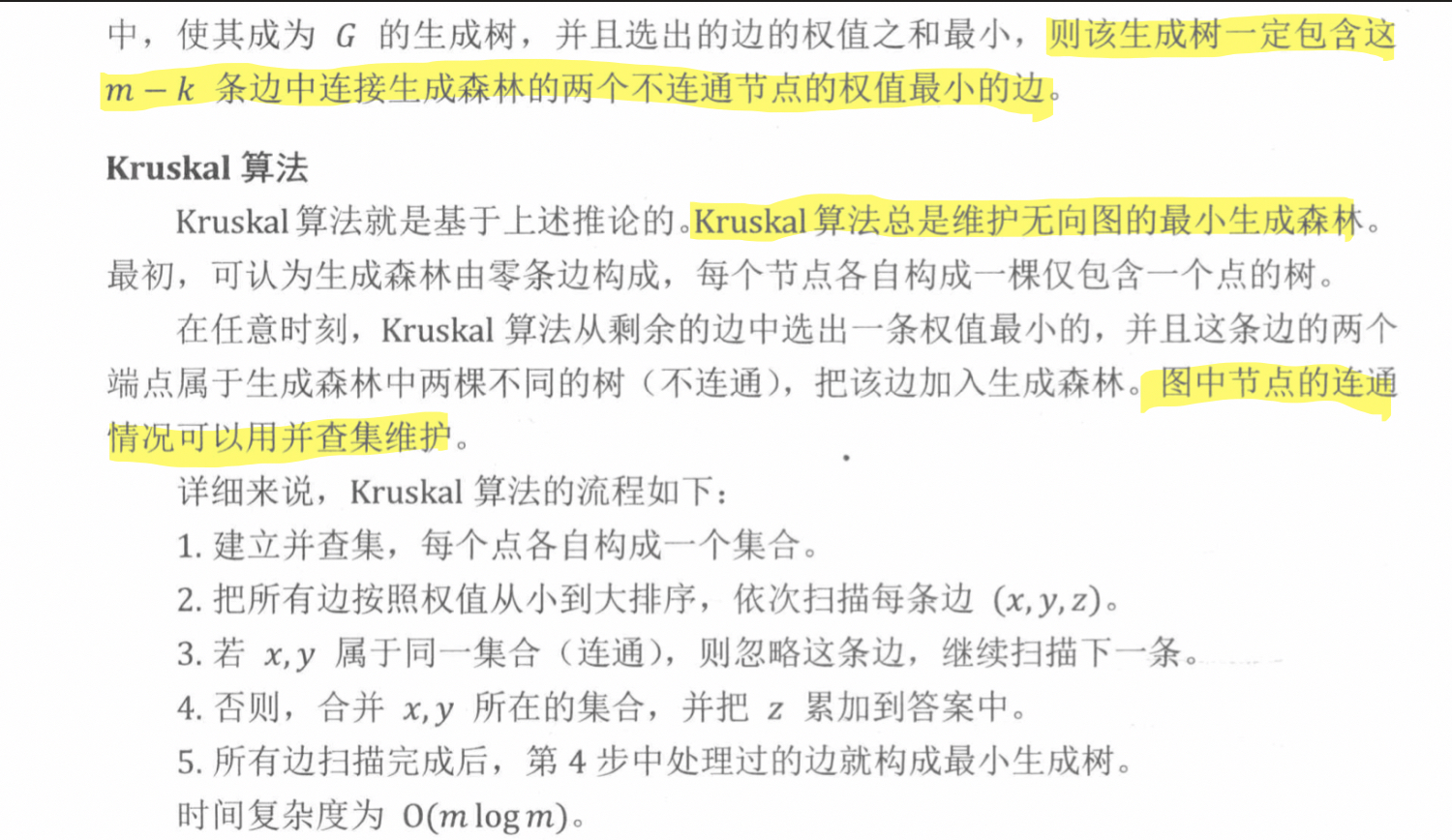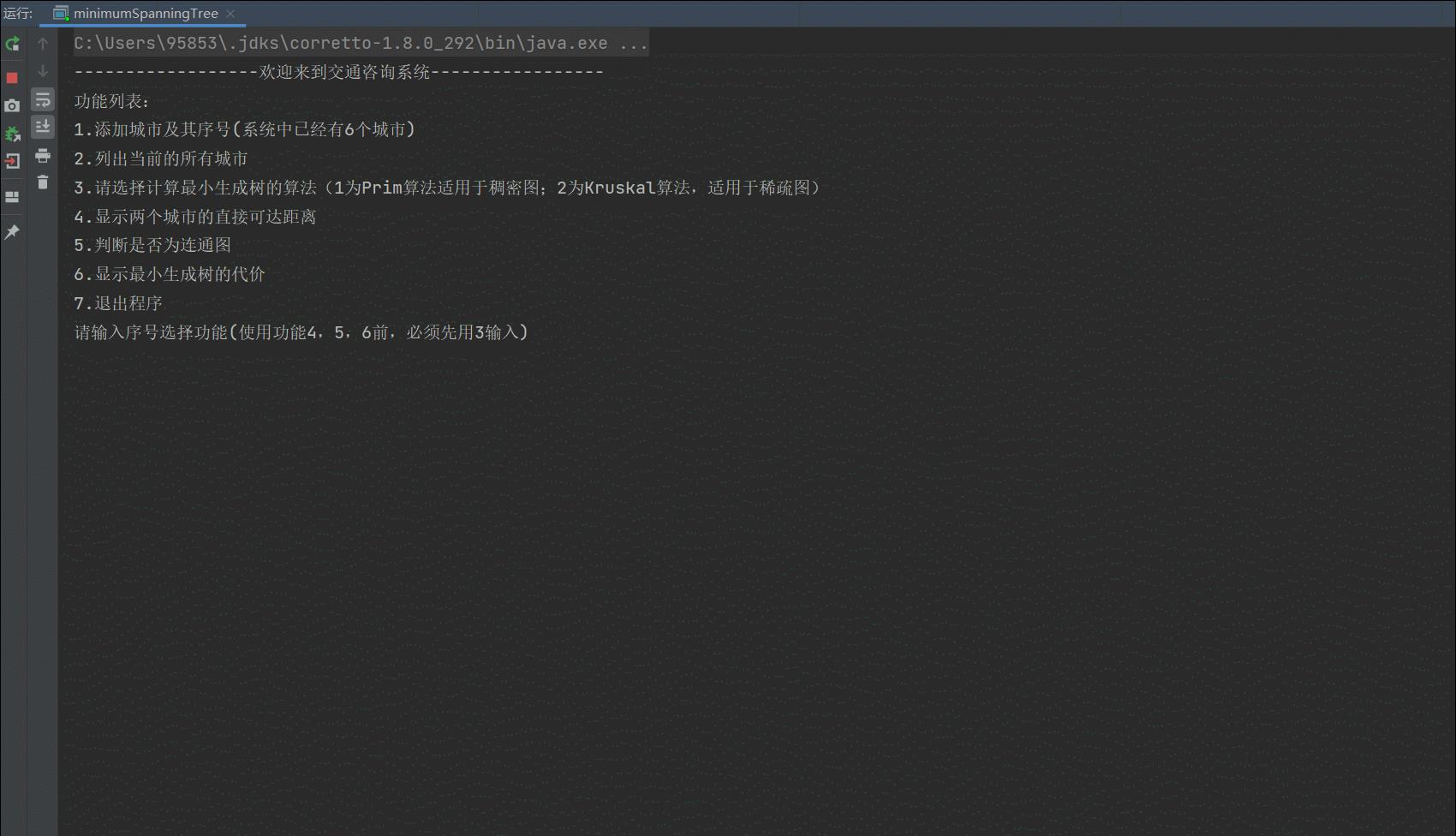太原理工大学2021软件学院数据结构课程设计第二题(构造可以使n个城市连接的最小生成树)核心代码(2021.6.6)
Posted 卷王2048
tags:
篇首语:本文由小常识网(cha138.com)小编为大家整理,主要介绍了太原理工大学2021软件学院数据结构课程设计第二题(构造可以使n个城市连接的最小生成树)核心代码(2021.6.6)相关的知识,希望对你有一定的参考价值。
太原理工大学2021软件学院数据结构课程设计第二题(构造可以使n个城市连接的最小生成树)核心代码(2021.6.6)
声明:这里只是给出核心代码
核心代码指程序的计算部分,不是完整程序
题目背景:P3366 【模板】最小生成树 - 洛谷 | 计算机科学教育新生态 (luogu.com.cn)
题目
题目描述
如题,给出一个无向图,求出最小生成树,如果该图不连通,则输出 orz。
输入格式
第一行包含两个整数 N,M,表示该图共有 N 个结点和 M 条无向边。
接下来 M 行每行包含三个整数xi,yi,zi,表示有一条长度为zi的无向边连接结点 xi,yi.
输出格式
如果该图连通,则输出一个整数表示最小生成树的各边的长度之和。如果该图不连通则输出 orz。
输入输出样例
**输入 **
4 5
1 2 2
1 3 2
1 4 3
2 3 4
3 4 3
输出 #1
7
最小生成树背景知识
1.最小生成树的代价指最小生成树各边长度之和


Kruscal算法代码
import java.io.*;
import java.util.Arrays;
import java.util.Comparator;
/**
* @see 图论 Kruscal https://www.luogu.com.cn/problem/P3366 https://www.acwing.com/solution/content/30279/
*/
public class Main {
static class Edge {
int a, b, w;
public Edge(int a, int b, int w) {
this.a = a;
this.b = b;
this.w = w;
}
}
static final int N = 100010;
static int n, m;
static int[] p;
static Edge[] edges;
static StreamTokenizer in = new StreamTokenizer(new BufferedReader(new InputStreamReader(System.in)));
static int nextInt() throws Exception {
in.nextToken();
return (int) in.nval;
}
static String next() throws Exception {
in.nextToken();
return in.sval;
}
/**
* 并查集find模板
* @param x 当前连通块的点
* @return
*/
static int find(int x) {
if (p[x]!=x){
p[x] = find(p[x]);
}
return p[x];
}
static int kruskal() {
Arrays.sort(edges, Comparator.comparingInt(a -> a.w));
for (int i = 1; i <= n; i++) {
p[i] = i;
}
int res = 0, count = 0;
for (int i = 0; i < m; i++) {
int a = edges[i].a, b = edges[i].b, w = edges[i].w;
a = find(a);
b = find(b);
if (a != b) {
p[a] = b;
res += w;
count++;
}
}
//判断是否连通
return count < n - 1 ? -1 : res;
}
public static void main(String[] args) throws Exception {
n = nextInt();
m = nextInt();
edges = new Edge[m];
p = new int[n + 1];
for (int i = 0; i < m; i++) {
int a = nextInt();
int b = nextInt();
int c = nextInt();
edges[i] = new Edge(a, b, c);
}
int ans = kruskal();
if (ans==-1){
System.out.println("orz");
}else {
System.out.println(ans);
}
}
}
Prim算法代码
package Acwing858Prim算法求最小生成树;
import java.io.*;
import java.util.Arrays;
/**
* @see 图论 最小生成树 Prim https://www.acwing.com/solution/content/38312/ https://www.luogu.com.cn/problem/P3366
*/
public class PrimClass {
static final int INF = 9999;
static int[][] ad;
static int[] dist;
static int n, m;
static boolean[] st;
static StreamTokenizer in = new StreamTokenizer(new BufferedReader(new InputStreamReader(System.in)));
static int nextInt() throws Exception {
in.nextToken();
return (int) in.nval;
}
static int prim() {
Arrays.fill(dist, INF);
int res = 0;
for (int i = 0; i < n; i++) {
int t = -1;
for (int j = 1; j <= n; j++) {
if (!st[j] && (t == -1 || dist[j] < dist[t])) {
t = j;
}
}
if (i > 0 && dist[t] == INF) {
return INF;
}
if (i > 0) {
res += dist[t];
}
for (int j = 1; j <= n; j++) {
dist[j] = Math.min(dist[j], ad[t][j]);
}
st[t] = true;
}
return res;
}
public static void main(String[] args) throws Exception {
n = nextInt();
m = nextInt();
dist = new int[n+1];
ad = new int[n+1][n+1];
st = new boolean[n+1];
for (int i = 1; i <= n; i++) {
for (int j = 1; j <= n; j++) {
if (i == j) {
ad[i][j] = 0;
} else {
ad[i][j] = INF;
}
}
}
while (m-- > 0) {
int a = nextInt();
int b = nextInt();
int c = nextInt();
ad[a][b] = Math.min(ad[a][b], c);
//-------------无向图-----------------------------
ad[b][a]= ad[a][b];
//-----------------------------------------------
}
int ans = prim();
if (ans == INF) {
System.out.println("orz");
} else {
System.out.println(ans);
}
}
}
再次强调,以上只是核心代码,同学们要根据核心代码,自己编写完整的程序
完整程序应该是这样

刷题不迷路,欢迎关注博主的git题集,这里有最详细的分类,最经典的例题和最全面的注释

感兴趣的同学可以赏个star吗:算法刷题集git地址 题目源码地址
以上是关于太原理工大学2021软件学院数据结构课程设计第二题(构造可以使n个城市连接的最小生成树)核心代码(2021.6.6)的主要内容,如果未能解决你的问题,请参考以下文章